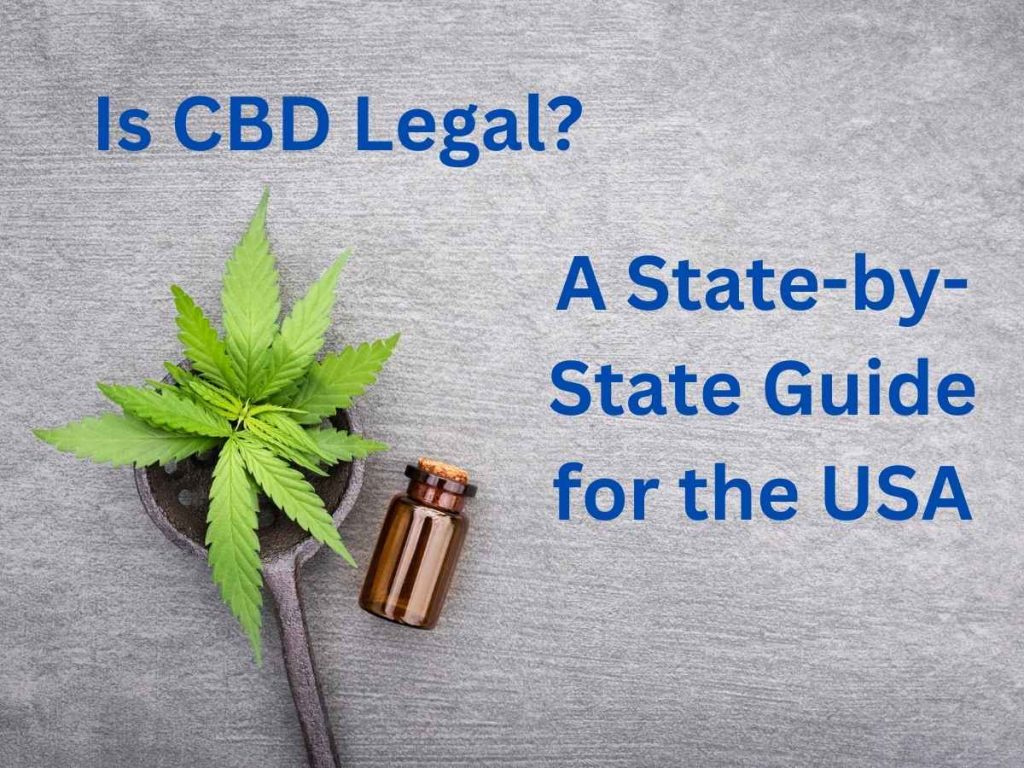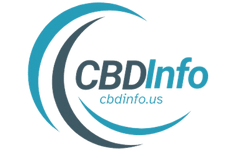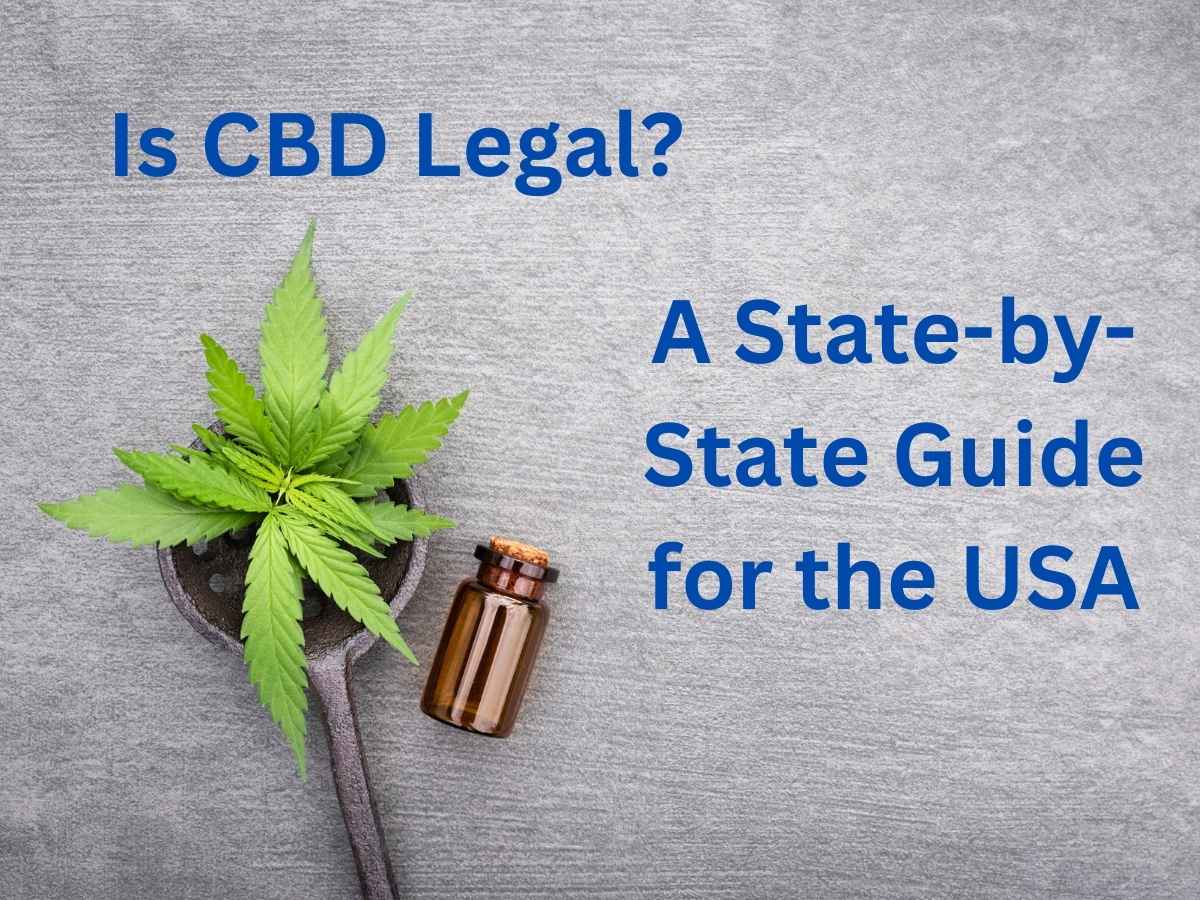The legal landscape surrounding CBD (cannabidiol) in the United States can be complex and sometimes confusing. While the 2018 Farm Bill legalized hemp-derived CBD at the federal level, individual states have the authority to regulate its sale and use within their borders. This comprehensive guide aims to clarify the legal status of CBD across all 50 states, helping you navigate the often murky waters of CBD legality.
Table of Contents
Understanding CBD and Federal Law
Before diving into state-specific regulations, it’s crucial to understand the federal stance on CBD:
The 2018 Farm Bill legalized the production and sale of hemp and hemp-derived products, including CBD, at the federal level. However, there are important caveats:
- CBD must be derived from hemp, not marijuana.
- Hemp is defined as cannabis plants containing less than 0.3% THC by dry weight.
- The FDA still regulates CBD in food, beverages, and dietary supplements.
Despite federal legalization, states have the power to impose their own restrictions or bans on CBD products. This has led to a patchwork of regulations across the country.

CBD Legality: State-by-State Breakdown
Here’s a comprehensive overview of CBD legality in each state as of 2024. Please note that laws can change rapidly, so it’s always best to check with local authorities or legal counsel for the most up-to-date information.
Alabama
Legal status: Legal
- Hemp-derived CBD products are legal.
- Medical cannabis program allows CBD with higher THC content for qualifying patients.
Alaska
Legal status: Legal
- Hemp-derived CBD products are legal.
- Recreational and medical marijuana are legal, allowing for CBD products with higher THC content.
Arizona
Legal status: Legal
- Hemp-derived CBD products are legal.
- Both medical and recreational marijuana are legal, allowing for CBD products with higher THC content.
Arkansas
Legal status: Legal
- Hemp-derived CBD products are legal.
- Medical marijuana program allows CBD products with higher THC content for qualifying patients.
California
Legal status: Legal
- Hemp-derived CBD products are legal.
- Both medical and recreational marijuana are legal, allowing for CBD products with higher THC content.
Colorado
Legal status: Legal
- Hemp-derived CBD products are legal.
- Both medical and recreational marijuana are legal, allowing for CBD products with higher THC content.
Connecticut
Legal status: Legal
- Hemp-derived CBD products are legal.
- Both medical and recreational marijuana are legal, allowing for CBD products with higher THC content.
Delaware
Legal status: Legal
- Hemp-derived CBD products are legal.
- Medical marijuana program allows CBD products with higher THC content for qualifying patients.
Florida
Legal status: Legal
- Hemp-derived CBD products are legal.
- Medical marijuana program allows CBD products with higher THC content for qualifying patients.
Georgia
Legal status: Legal with restrictions
- Hemp-derived CBD products are legal.
- Low-THC oil is legal for qualifying medical conditions, but other forms of medical marijuana are not allowed.
Hawaii
Legal status: Legal
- Hemp-derived CBD products are legal.
- Medical marijuana program allows CBD products with higher THC content for qualifying patients.
Idaho
Legal status: Legal with restrictions
- Only CBD products with 0% THC are legal.
- No medical marijuana program.
Illinois
Legal status: Legal
- Hemp-derived CBD products are legal.
- Both medical and recreational marijuana are legal, allowing for CBD products with higher THC content.
Indiana
Legal status: Legal
- Hemp-derived CBD products are legal.
- No medical marijuana program.
Iowa
Legal status: Legal with restrictions
- Hemp-derived CBD products are legal.
- Medical CBD program allows for CBD products with up to 3% THC for qualifying patients.
Kansas
Legal status: Legal
- Hemp-derived CBD products are legal.
- No medical marijuana program.
Kentucky
Legal status: Legal
- Hemp-derived CBD products are legal.
- No medical marijuana program.
Louisiana
Legal status: Legal
- Hemp-derived CBD products are legal.
- Medical marijuana program allows CBD products with higher THC content for qualifying patients.
Maine
Legal status: Legal
- Hemp-derived CBD products are legal.
- Both medical and recreational marijuana are legal, allowing for CBD products with higher THC content.
Maryland
Legal status: Legal
- Hemp-derived CBD products are legal.
- Both medical and recreational marijuana are legal, allowing for CBD products with higher THC content.
Massachusetts
Legal status: Legal
- Hemp-derived CBD products are legal.
- Both medical and recreational marijuana are legal, allowing for CBD products with higher THC content.
Michigan
Legal status: Legal
- Hemp-derived CBD products are legal.
- Both medical and recreational marijuana are legal, allowing for CBD products with higher THC content.
Minnesota
Legal status: Legal
- Hemp-derived CBD products are legal.
- Medical marijuana program allows CBD products with higher THC content for qualifying patients.
Mississippi
Legal status: Legal
- Hemp-derived CBD products are legal.
- Medical marijuana program allows CBD products with higher THC content for qualifying patients.
Missouri
Legal status: Legal
- Hemp-derived CBD products are legal.
- Both medical and recreational marijuana are legal, allowing for CBD products with higher THC content.
Montana
Legal status: Legal
- Hemp-derived CBD products are legal.
- Both medical and recreational marijuana are legal, allowing for CBD products with higher THC content.
Nebraska
Legal status: Legal
- Hemp-derived CBD products are legal.
- No medical marijuana program.
Nevada
Legal status: Legal
- Hemp-derived CBD products are legal.
- Both medical and recreational marijuana are legal, allowing for CBD products with higher THC content.
New Hampshire
Legal status: Legal
- Hemp-derived CBD products are legal.
- Medical marijuana program allows CBD products with higher THC content for qualifying patients.
New Jersey
Legal status: Legal
- Hemp-derived CBD products are legal.
- Both medical and recreational marijuana are legal, allowing for CBD products with higher THC content.
New Mexico
Legal status: Legal
- Hemp-derived CBD products are legal.
- Both medical and recreational marijuana are legal, allowing for CBD products with higher THC content.
New York
Legal status: Legal
- Hemp-derived CBD products are legal.
- Both medical and recreational marijuana are legal, allowing for CBD products with higher THC content.
North Carolina
Legal status: Legal
- Hemp-derived CBD products are legal.
- No medical marijuana program, but CBD oil is allowed for specific medical conditions.
North Dakota
Legal status: Legal
- Hemp-derived CBD products are legal.
- Medical marijuana program allows CBD products with higher THC content for qualifying patients.
Ohio
Legal status: Legal
- Hemp-derived CBD products are legal.
- Medical marijuana program allows CBD products with higher THC content for qualifying patients.
Oklahoma
Legal status: Legal
- Hemp-derived CBD products are legal.
- Medical marijuana program allows CBD products with higher THC content for qualifying patients.
Oregon
Legal status: Legal
- Hemp-derived CBD products are legal.
- Both medical and recreational marijuana are legal, allowing for CBD products with higher THC content.
Pennsylvania
Legal status: Legal
- Hemp-derived CBD products are legal.
- Medical marijuana program allows CBD products with higher THC content for qualifying patients.
Rhode Island
Legal status: Legal
- Hemp-derived CBD products are legal.
- Both medical and recreational marijuana are legal, allowing for CBD products with higher THC content.
South Carolina
Legal status: Legal with restrictions
- Hemp-derived CBD products are legal.
- Low-THC CBD oil is legal for specific medical conditions.
South Dakota
Legal status: Legal
- Hemp-derived CBD products are legal.
- Medical marijuana program allows CBD products with higher THC content for qualifying patients.
Tennessee
Legal status: Legal
- Hemp-derived CBD products are legal.
- No medical marijuana program, but CBD oil is allowed for specific medical conditions.
Texas
Legal status: Legal
- Hemp-derived CBD products are legal.
- Medical marijuana program allows low-THC CBD oil for specific medical conditions.
Utah
Legal status: Legal
- Hemp-derived CBD products are legal.
- Medical marijuana program allows CBD products with higher THC content for qualifying patients.
Vermont
Legal status: Legal
- Hemp-derived CBD products are legal.
- Both medical and recreational marijuana are legal, allowing for CBD products with higher THC content.
Virginia
Legal status: Legal
- Hemp-derived CBD products are legal.
- Both medical and recreational marijuana are legal, allowing for CBD products with higher THC content.
Washington
Legal status: Legal
- Hemp-derived CBD products are legal.
- Both medical and recreational marijuana are legal, allowing for CBD products with higher THC content.
West Virginia
Legal status: Legal
- Hemp-derived CBD products are legal.
- Medical marijuana program allows CBD products with higher THC content for qualifying patients.
Wisconsin
Legal status: Legal
- Hemp-derived CBD products are legal.
- Medical marijuana program allows CBD products with low THC content for specific medical conditions.
Wyoming
Legal status: Legal
- Hemp-derived CBD products are legal.
- No medical marijuana program, but CBD oil is allowed for specific medical conditions.
Factors Affecting CBD Legality
While the above guide provides a general overview, several factors can affect the legality of CBD products in different states:
- Source of CBD: Hemp-derived CBD is generally more widely accepted than marijuana-derived CBD.
- THC content: Many states require CBD products to contain less than 0.3% THC to be considered legal.
- Product type: Some states have different regulations for CBD in food and beverages compared to oils or topicals.
- Intended use: Medical use of CBD may be subject to different regulations than recreational use.
- Licensing and testing requirements: Some states require CBD products to be tested or sold only by licensed retailers.
Federal vs. State Law
It’s important to note that while hemp-derived CBD is federally legal, state laws can be more restrictive. In cases where state and federal laws conflict, state law typically takes precedence. This means that even though CBD is legal at the federal level, it may be restricted or prohibited in certain states.
FDA Stance on CBD
The U.S. Food and Drug Administration (FDA) maintains regulatory authority over CBD products. As of 2024, the FDA has not approved CBD for use in food or dietary supplements. The agency has approved one CBD-based medication, Epidiolex, for treating specific forms of epilepsy.
The FDA continues to evaluate the regulatory frameworks for CBD products and has expressed concerns about their safety and marketing claims. This ongoing evaluation may lead to changes in federal regulations in the future.
Tips for Consumers
- Research local laws: Always check your state and local laws before purchasing or using CBD products.
- Buy from reputable sources: Look for products from companies that provide third-party lab testing results.
- Check THC content: Ensure the product contains less than 0.3% THC to comply with federal law.
- Be cautious with drug tests: Even legal CBD products may contain trace amounts of THC that could potentially trigger a positive drug test.
- Consult healthcare providers: If you’re using CBD for medical reasons, consult with a healthcare professional, especially if you’re taking other medications.
Conclusion
The legal status of CBD in the United States is a complex and evolving issue. While hemp-derived CBD is federally legal, state laws vary widely, creating a patchwork of regulations across the country. As a consumer, it’s crucial to stay informed about the laws in your state and any states you plan to visit or transport CBD products through.
Remember that this guide provides general information and should not be considered legal advice. Laws and regulations surrounding CBD are subject to change, and local enforcement may vary. Always consult with legal professionals or local authorities for the most up-to-date and specific information regarding CBD legality in your area.
FAQs
Is CBD legal in all 50 states?
While hemp-derived CBD (containing less than 0.3% THC) is legal at the federal level, individual states have the authority to restrict or ban CBD products. Most states allow hemp-derived CBD, but some have specific restrictions or requirements.
Can I travel with CBD products?
Interstate travel with hemp-derived CBD products is generally allowed under federal law. However, it’s important to research the laws of any states you’ll be traveling through or to, as some states have stricter regulations.
Can I buy CBD products online?
In most cases, you can buy CBD products online if they’re legal in your state. However, be cautious and ensure you’re purchasing from reputable sources that comply with federal and state regulations.
Will using CBD products make me fail a drug test?
While pure CBD shouldn’t trigger a positive drug test, some CBD products may contain trace amounts of THC. If you’re subject to drug testing, it’s best to use extreme caution or avoid CBD products altogether.
Is medical marijuana the same as CBD?
No, medical marijuana typically contains higher levels of THC and is subject to different regulations than hemp-derived CBD products. However, some medical marijuana programs include high-CBD, low-THC products.
References
[1] H.R.2 – Agriculture Improvement Act of 2018. (2018). Congress.gov.
https://www.congress.gov/bill/115th-congress/house-bill/2/text
[2] State Medical Marijuana Laws. (2024). National Conference of State Legislatures.
https://www.ncsl.org/research/health/state-medical-marijuana-laws.asp
[3] FDA Regulation of Cannabis and Cannabis-Derived Products, Including Cannabidiol (CBD). (2024). U.S. Food and Drug Administration.
https://www.fda.gov/news-events/public-health-focus/fda-regulation-cannabis-and-cannabis-derived-products-including-cannabidiol-cbd
[4] Corroon, J., & Kight, R. (2018). Regulatory Status of Cannabidiol in the United States: A Perspective. Cannabis and Cannabinoid Research, 3(1), 190-194.
https://www.ncbi.nlm.nih.gov/pmc/articles/PMC6154432/

